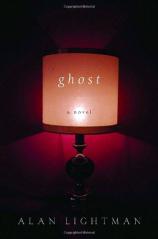Ghost
Review
Ghost
David Kurzweil is a middling man. He is middle-aged and a
former middle manager who has lost his job at a large bank and soon
finds himself working as an assistant at a family-owned funeral
home. Although bright and intellectually curious (he reads Hume and
Descartes and attended law school for one semester), he is content
to live a tranquil life in a modest, all-male apartment building,
sharing quiet evenings at home and walking around a lake with his
librarian girlfriend. But what happens to him one afternoon in the
funeral home's slumber room --- when he believes he sees "vapor
[come] out of a dead body" --- changes his life irrevocably and
serves as the springboard for this thoughtful and affecting
novel.
At first David is reluctant to embrace the import of his
experience: "He believes that something has happened to him, but he
doesn't know what it is, and he wants to explore it slowly and
gingerly, like an ambiguous but riveting smile in the distance."
When reports of the sighting inevitably leak to the press, he is
besieged by desperate people who believe he has supernatural powers
and want him to communicate with their deceased relatives and
friends.
Soon David is approached by an organization known as the Society
for the Second World, whose leaders think they have found an
appealing Everyman to popularize their beliefs. Eventually they
persuade him to submit to testing by a Dr. Tettlebeim, using a Rube
Goldberg-like contraption called an "R box" --- for random number
generator --- to see if his mind can influence the distribution of
those numbers. He is pulled in the other direction by a skeptical
college classmate, Ronald Mickleweed (the professionals in the
novel, including a lawyer named Pillbeam, all have odd, almost
Dickensian, names), a professor of physics at their alma mater. The
investigators press their claims against each other in a series of
tests that ultimately allow each side to claim that its position
has been vindicated.
As troubled as David is by his sudden notoriety, his life is thrown
into more turmoil when his ex-wife Bethany unexpectedly reappears
in town. Their encounter revives his suppressed feelings for her
and threatens to undermine his relationship with his girlfriend
Ellen. What happiness David experiences is further shadowed by the
childhood death of his father and his mother's failing
health.
Alan Lightman, a professor of theoretical physics at M.I.T., is one
of those remarkable thinkers able to bridge the worlds of science
and humanism while giving equal respect to each. He takes no sides
in the debate between those who believe in the paranormal and its
scientific challengers, leaving it to his readers to sift through
the evidence and make their choice. Still, it's fair to say his
sympathies lie with those who give at least some credence to the
notion of a hidden world. Lightman's observations about the
possibility of that nonmaterial realm are lyrical and moving.
Describing David's uncertainty about whether his experience was
anything more than a visual hallucination, he writes, "At times, he
has felt the world opening up around him, shifting, cracks forming
in the wall of experience, and he has been poised to see through
those cracks. The supernatural he cannot accept. But he does
believe that there is something unseen behind common experience,
some totality, which can be glimpsed only between the
cracks." Lightman evokes his first novel, EINSTEIN'S DREAMS, a
strikingly original meditation on the nature of time, when he
quotes the eminent scientist in a similar vein: "The most beautiful
experience we can have is the mysterious. It is the fundamental
emotion which stands at the cradle of true art and true
science."
Lightman is an empathetic writer who sketches even his relatively
minor characters with depth and subtlety. Most notable among them
is Martin Shaw, the aging, fourth-generation funeral director who
collects stamps and quotes William Blake and who is less concerned
about the validity of David's experience than he is about the flood
of business generated by the reports of the extraordinary
sighting.
What Lightman does with both compassion and sensitivity in GHOST is
to suggest gently to even the most skeptical among us the
possibility that there's a real world beyond the one we can
perceive with our senses. "The seconds and years stretch to
infinity," he writes, "but a thing might be felt only at one
moment. It might always be there, the world underneath and the
miracle, but felt only in brief, fleeting stabs." GHOST elegantly
traverses the shadowy boundary between faith and reason, belief and
science, and Alan Lightman is a capable guide to that
territory.
Reviewed by Harvey Freedenberg (mwn52@aol.com) on January 22, 2011
Ghost
- Publication Date: October 23, 2007
- Genres: Fiction
- Hardcover: 244 pages
- Publisher: Pantheon
- ISBN-10: 0375421696
- ISBN-13: 9780375421693





